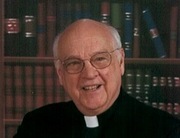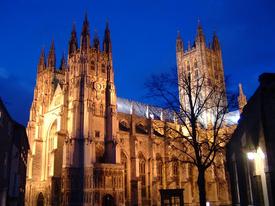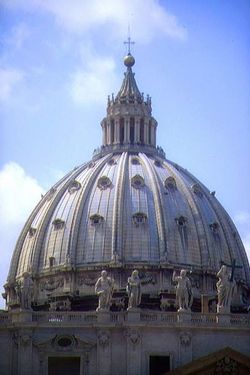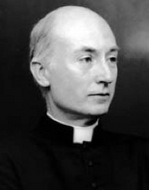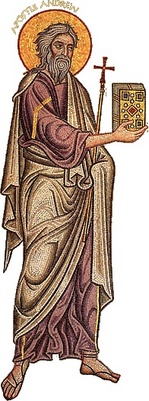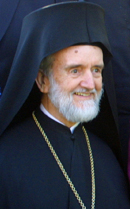Edward Pentin of the National Catholic Register penned a piece “Cardinal Kasper on Anglicanorum Coetibus” which dispels much of the misinformation found in both the secular and Catholic media, including certain blogs, about the recent events between Canterbury and Rome. Hopefully, L’Osservatore Romano will provide an English translation of the article they published as a referenced by Mr. Pentin; I am curious to know more. One thing to remember is to interpret these things with charity and understanding. Pray, too, for a profitable meeting between Archbishop Williams and Pope Benedict on Saturday.
Category: Ecumenism
Moscow & Rome to meet soon?
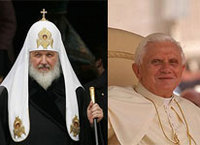 Do you read the Interfax news agency from Moscow. Every now-and-again you should just to keep up with news not seemingly connected with own. Today, Interfax is reporting that Archbishop Hilarion has indicated that a meeting between Russian Orthodox Patriarch Kyrill and Pope Benedict XVI is on the table. No definite plans appear to have been made but there seem to be significant discussions pointing to a meeting. Interesting that this announcement is on the liturgical memorial of Saint Josaphat, brutally martyred by the Ordthodx (on the Latin calendar).
Do you read the Interfax news agency from Moscow. Every now-and-again you should just to keep up with news not seemingly connected with own. Today, Interfax is reporting that Archbishop Hilarion has indicated that a meeting between Russian Orthodox Patriarch Kyrill and Pope Benedict XVI is on the table. No definite plans appear to have been made but there seem to be significant discussions pointing to a meeting. Interesting that this announcement is on the liturgical memorial of Saint Josaphat, brutally martyred by the Ordthodx (on the Latin calendar).
Anglicanorum Coetibus: the Apostolic Constitution as a new avenue for Full Communion of the Anglicans with Rome
This morning the Holy See published the Apostolic Constitution Anglicanorum Coetibus which provides a structure for Anglicans coming into full, visible communion with the Bishop of Rome.
Vatican Press Office clarifies some issues on Anglican entrance into full communion
The Pope’s press officer, Jesuit Father Federico
Lombardi, addressed issues regarding the forthcoming Apostolic Constitution on
Personal Ordinariates for the Anglicans entering full communion with the
Catholic Church this today:
supposedly knowledgeable remarks by an Italian correspondent Andrea Tornielli,
that the delay in publication of the Apostolic Constitution regarding Personal
Ordinariates for Anglicans entering into full communion with the Catholic
Church, announced on October 20, 2009, by Cardinal William Levada, Prefect of
the Congregation for the Doctrine of the Faith, is due to more than
“technical” reasons. According to this speculation, there is a
serious substantial issue at the basis of the delay, namely, disagreement about
whether celibacy will be the norm for the future clergy of the Provision.
Levada offered the following comments on this speculation: “Had I been
asked I would happily have clarified any doubt about my remarks at the press
conference. There is no substance to such speculation. No one at the Vatican
has mentioned any such issue to me. The delay is purely technical in the sense
of ensuring consistency in canonical language and references. The translation
issues are secondary; the decision not to delay publication in order to wait
for the ‘official’ Latin text to be published in Acta Apostolicae Sedis was
made some time ago.
study and approval through the usual process followed by the Congregation, have
all included the following statement, currently Article VI of the
Constitution:
and who fulfill the requisites established by canon law and are not impeded by
irregularities or other impediments may be accepted by the Ordinary as
candidates for Holy Orders in the Catholic Church. In the case of married
ministers, the norms established in the Encyclical Letter of Pope Paul VI
Sacerdotalis coelibatus, n. 42 and in the Statement “In June” are to
be observed. Unmarried ministers must submit to the norm of clerical celibacy
of CIC can. 277, §1.
celibate clergy in the Latin Church, as a rule (pro regula) will admit only
celibate men to the order of presbyter. He may also petition the Roman Pontiff,
as a derogation from can. 277, §1, for the admission of married men to the
order of presbyter on a case by case basis, according to objective criteria
approved by the Holy See.
the current practice of the Church, in which married former Anglican ministers
may be admitted to priestly ministry in the Catholic Church on a case by case
basis. With regard to future seminarians, it was considered purely speculative
whether there might be some cases in which a dispensation from the celibacy
rule might be petitioned. For this reason, objective criteria about any such
possibilities (e.g. married seminarians already in preparation) are to be developed
jointly by the Personal Ordinariate and the Episcopal Conference, and submitted
for approval of the Holy See.”
technical work on the Constitution and Norms will be completed by the end of
the first week of November.
Msgr. Stetson speaks about the Personal Ordinariate
Zenit ran an interview the other about the recent
development of possibilities of full communion of the Anglicans with Rome. The
details of how this gesture of the Church has yet to be revealed by the
Magisterium. Here is part of Karna Sawanson’s interview with Monsignor
William Stetson, secretary to the Ecclesiastical Delegate of the Congregation
for the Doctrine of the Faith for the Pastoral Provision for former Episcopal
priests. This part of the interview has to do with “personal ordinariates,” the
ecclesial structure proposed for living in the context of Anglican ways.
ZENIT:
What is the aim of establishing the personal ordinariates? Why was the pastoral
provision not sufficient?
Msgr. Stetson: The pastoral provision is merely an
administrative process for preparing married, former Episcopal priests to be
ordained as Catholic priests at the request of diocesan bishops. The new
ordinariate will provide a canonical structure similar to a diocese for the
pastoral care of lay faithful who convert from the Episcopal church.
ZENIT:
This canonical structure seems to respond directly to a petition made two years
ago by the Traditional Anglican Communion, which has about 400,000 members
worldwide. Do you see many or most of these members entering into communion
with the Catholic Church through the personal ordinariate?
Msgr. Stetson: The
Traditional Anglican Communion is in reality a confederation of so-called
dioceses located in many different countries; it is made up of priests and lay
people and bishops. The Traditional Anglican Communion as such has never been
part of the Anglican Communion under the Archbishop of Canterbury. What will
happen to the dioceses in particular countries will depend on the decisions
reached by the Catholic hierarchy in the respective countries together with the
Congregation for the Doctrine of the Faith. Their numbers are greater in Africa
and Asia.
ZENIT: What will the process look like for Anglicans, especially
priests and bishops, entering the Church through the ordinariate?
Msgr.
Stetson: The Apostolic Constitution allowing for the creation of ordinariates
in each country has not yet been issued. For this reason we do not know the
nature of the process. I would anticipate that it will be similar to that used
for the last 27 years by the Pastoral Provision here in the United States, and
its counterpart in England (that did not, however, provide for parishes and liturgy,
as in the United States.)
ZENIT: The Vatican announcement provided for the
possibility of an Anglican ordinariate having seminarians, who are to be
prepared alongside Catholic seminarians, “though the ordinariate may
establish a house of formation to address the particular needs of formation in
the Anglican patrimony.” Would this include the possibility of marriage
for these Anglican seminarians?
Msgr. Stetson: The specifics have not yet been
made known on this question. At the very least I would assume that the
seminarians would have to be both married and studying in an Anglican seminary
at the time they sought to enter into full communion, and then continue
studying for the priesthood in a Catholic seminary. They would have to be
dispensed from the norm of celibacy on a case-by-case basis by the Holy See.
Future seminarians would have to be celibate.
ZENIT: What other traditions will
the Anglicans retain when they enter the Catholic Church by way of the personal
ordinariate?
Msgr. Stetson: Small parishes that allow for greater cohesion
together. A rich tradition of liturgical expression (language, music,
vestments, space, etc.) in English, dating back to the 16th century. This would
also include a great tradition of the use of sacred Scripture in preaching,
love for the Fathers of the Church and theological expression beyond that of
Roman Catholic scholasticism.
ZENIT: Why is the Vatican able to offer this
concession only to Anglicans, and not Lutherans, Presbyterians, etc., who would
like to enter the Church?
Msgr. Stetson: Anglicans have always enjoyed a
special place in Roman Catholic attitudes toward the rupture of Christian unity
in the West after the 16th century. The Church of England sought to retain many
elements of the Catholic Church while at the same time being Protestant. The
Church of England maintained a greater unity within itself and thus could be
dealt with as a single entity in conversations with Rome.
Thoughts on the Holy See’s offer to the Anglicans to come to Rome
It is a dramatic slap-down of
liberal Anglicanism and a total repudiation of the ordination of women,
homosexual marriage and the general neglect of doctrine in Anglicanism. Indeed,
it is a final rejection of Anglicanism. It basically interprets Anglicanism as
a spiritual patrimony based on ethnic tradition rather than substantial
doctrine and makes clear that it is not a historic “church” but
rather an “ecclesial community” that strayed and now is invited to return
to communion with the Pope as Successor of Peter.
The Vatican was careful to
schedule simultaneously with the Vatican announcement, a press conference of
the Catholic Archbishop of Westminster and the deeply humiliated Anglican
Archbishop of Canterbury to enable the Anglicans to save some face by saying
that this recognizes the spiritual patrimony of Anglicanism and that ecumenical
dialogue goes ahead. That is like George Washington at Yorktown saying that he
recognizes the cultural contributions of Britain and hopes diplomatic relations
flourish. The Apostolic Constitution is not a retraction of ecumenical desires,
but rather is the fulfillment of ecumenical aspirations, albeit not the way
most Anglican leaders had envisioned it.
The press, uninformed and always
tabloid in matters of religion, will zoom in on the permission for married
priests. They will miss the most important point: that this reiterates the
Catholic Church’s insistence that Anglican Holy Orders are invalid, and
perforce so is their Eucharist. These married Anglican priests have to be fully
and validly ordained by a Catholic bishop. Following Orthodox custom, they
are allowed to marry only before ordination and not after. And no married man
may become a bishop. (Thus, any Anglican bishop joining one of these
“ordinariates” would no longer be recognized as a bishop. Under
special provision, Anglican bishops would have some right to pastoral authority,
but would not be bishops.)
It remains to be seen how many Anglicans
(Episcopalians in the USA) will be received into the Catholic Church under
these provisions, but it is a final nail in the coffin of the rapidly
disintegrating Anglicanism at least in the West and will radically challenge
Anglicans in other parts of the world. Perhaps most importantly, it sets a
precedent for reunion with Orthodox churches whose Holy Orders the Catholic
Church already recognizes as valid. I should not be surprised if the Anglican
Archbishop of Canterbury eventually is received into the Catholic Church, at
least when he retires and gets a patent of nobility and a pension.
Fr. George
Rutler is pastor of The Church of Our Saviour in New York City and is a convert
to Catholicism from the Anglican Communion.
Ecumenical Patriarch visits USA
Pope gives Anglicans a path to union with the Catholic Church
The Congregation for the Doctrine of the Faith, in the name of Pope Benedict, is providing a formal way (a canonical structure) of allowing Anglicans to enter in Full Communion with the Catholic that sets up a structure similar to that of Opus Dei. Instead of calling the structure a “prelature” it is being called a “Personal Ordinariat.” Many things attributed to the Anglican Communion may be brought into their being Catholic including the Liturgy, married clergy, and other customs not in conflict with the Roman faith.
Speculation of East-West Reunion is too premature
Metropolitan
John Zizioulas of Pergamon sent a letter to the Archbishop of Greece and to all
Metropolitans of the Church of Greece reflecting on their acerbic and
uninformed opinion regarding theological dialogue with the See of Rome. Rigid adherence to one’s opinion is sinful. Metropolitan John is a consequential theologian and therefore I think his
insight matters. Clearly one gets the impression he distrusts imprudent public
speculation as to when and how a “reunion of the Orthodox and Catholic Churches”
is to take place. A too hopeful stance is unrealistic and does not account for
the continued dogmatic, ecclesiological differences yet to be resolved. One
wonders if the Catholic theologians and media people actually do their homework
or whether clichés is all they know. There is reason to believe we want to see partial reality.
Your Eminence,
Given that much turmoil has
been unduly created by certain circles, on the subject of the official
theological Dialogue between Orthodox and Roman Catholics, and that views have
also been expressed, which often range between inaccuracy and open falsehood
and slander, I am hereby addressing Your affection in order to clarify the
following:
1. The aforementioned theological Dialogue does not constitute a
concern of the Ecumenical Patriarchate, and much less, that of a specific
person, but is something that is taking place upon the decision of all the
autocephalous and autonomous Orthodox Churches without exception. Specifically
with regard to the present period of the Dialogue, during which the undersigned
has the co-chairmanship from the Orthodox side, the agreement of all the
Orthodox Churches for the continuation of the Dialogue has been recorded in
Memoranda signed by the venerable Primates of the Orthodox Churches, which are
hereto attached in photocopy. As Your Eminence will see when reading
these Memoranda, even the most holy Church of Greece – and in fact with a
Synodical decision – has admitted that “despite the existing difficulties,
which spring from the provocative activities of Unia to the detriment of the
flock of the Orthodox Church, the said Theological Dialogue must
continue.” Consequently, those opposed to the said theological
Dialogue are doubting and judging pan-Orthodox decisions, which have been
reached synodically. By claiming solely as their own the genuine conscience of
Orthodoxy, these people are in essence doubting the Orthodoxy not only of
certain persons – as they misguidedly insist – but of the very Primates and
sacred Synods of all the most holy Orthodox Churches.
2. The same things apply
in the case of the said Dialogue. We are informed that a certain
professor in his letter to the Reverend Hierarchs is censuring the topic of
primacy as a chosen topic for the theological Dialogue, and believes that the
Dialogue should be concerning itself with other matters. But the said
professor is either ignorant of, or indifferent to, the fact that – again – the
topic of the Dialogue was decided on at a pan-orthodox level. The attached
Memoranda, signed by all the Primates of the Orthodox Churches, testify to and
verify this. The most holy Church of Greece thus accepts that “this
discussion (regarding Unia) can, for the sake of facilitating the course of the
Dialogue, be conducted within the framework of ecclesiology through the prism
of the primacy”. This is precisely what we normally intend to do,
during the forthcoming discussion of the subject “The Primacy during the
2nd Millennium”, which is also when Unia first appeared. The remaining
topics that the said professor referred to will by no means be overlooked by
the Dialogue. However, during the present phase, as decided at an
inter-orthodox level from the beginning of the Dialogue, the focal point of the
discussion is Ecclesiology. It is duly respected and legitimate, for the said
professor – or anyone else – to have a different point of view, but it is
inadmissible to be crying out that Orthodoxy is in danger because the Primates
who are shepherding Her do not share his opinion. Where are we heading as
a Church, my Reverend holy brother?
3. It is being propagated very falsely and
conspiringly that the signing of the union of the Churches is imminent! A
professor emeritus of Theology, who is well known for his ill-will towards my
person, had visited a Hierarch of the Church of Greece and had told him that he
knew with certainty (!) that the union had already been signed (in Ravenna!)
and that the relative announcement was a matter of time!!! Clergy and
laity have approached me and asked me if it is true that the union is to be
signed in Cyprus, in October! Obviously, a feeling of unrest is being
attempted among the people of God through this behaviour, with unpredictable
consequences for the unity of the Church. However, those who are
disseminating these things are fully aware (as long as they have not been
blinded by empathy, fanaticism or a mania for self-projection), firstly, that
the ongoing theological Dialogue has yet to span an extremely long course,
because the theological differences that have accumulated during the one
thousand years of division are many; and secondly, that the Committee for the
Dialogue is entirely unqualified for the “signing” of a union, given
that this right belongs to the Synods of the Churches. Therefore, why all
the misinformation? Can’t the disseminators of these false “updates”
think of what the consequences will be for the unity of the Church? «He
who agitates (God’s people) shall bear the blame, whoever he may be» (Galatians
5:10).
Your Eminence,
The responsibility of all of us, and mostly of the
bishops who have been appointed by God to cater to the safeguarding of the
canonical unity of their flock, is an immense one.
What is being jeopardized is
ecclesiological: What is the authority and the prestige of Conciliar decisions?
Do we conform to the Conciliar decisions as we are already doing – and being
attacked for doing so – or do we conform to the “zealots” of
Orthodoxy? Can there be an Orthodoxy and Dogmas without any Conciliar
rulings?
We ask you to please place yourself on the matter, before we are led
to a complete demerit of Conciliar decisions, and before Your flock
disintegrates because of negligence on our part.
In humility and in awareness
of episcopal responsibility, we submit the above to Your affection and judgment
and remain,
in Athens the 26th of September 2009
With Respect, honour and love
in the Lord
+ John of Pergamon
Orthodox Co-Chairman of the Committee for the
Theological Dialogue between Orthodox and Roman Catholics
Catholics and Orthodox unite? Solidarity possible?
Good question. Not a question that you hear with any degree of seriousness in the Church among the “middle management” and met with wonder among the laity. In the recent past tensions have been fired up in various circles. The question of unity among the Catholics and Orthodox has been the lightening rod between the two churches for a long time. One can’t forget the tensions over the establishment of Catholic dioceses in Russia or the refusal of the previous Russian Patriarch to allow John Paul II to visit Russia and the walking out of high level theological discussions of the Orthodox, etc. Now none of this is meant to point figures at any one church official or way of proceeding as much as it is to remember recent history and to note where we have come in a short span of time.
